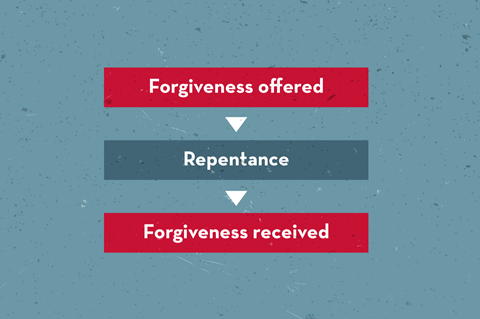Letting go of bitterness is not the same as forgiving someone, says Dr David Instone-Brewer

When Jesus was hanging on the cross, he did something amazing: he asked his Father to forgive his executioners. But this didn’t mean that they were now forgiven by God; it meant they would be forgiven if they repented.
Forgiveness is a response to repentance – like an answer is a response to a question, or thanks is a response to a gift. When a homeless person holds out his hand and says: “Thank you,” they are pre-emptively responding to something you haven’t yet done. It’s only when they receive something from you that their thanks make sense. And Jesus’ forgiveness of his crucifiers was pre-emptive. He didn’t say: “You are forgiven”, or even: “I forgive you.” He asked his Father to forgive them, knowing this couldn’t happen until they repented.
When someone who has hurt you sincerely apologises (ie they repent), you can accept their apology (ie forgive them), and then your relationship can start to heal (ie you can be reconciled). But if either repentance or forgiveness is missing, then reconciliation can’t happen. To put it in non-theological terms: if they don’t say “Sorry”, and you don’t say “That’s OK”, your friendship remains broken.
The same occurs with salvation. When we say sorry to God and decide to follow Jesus (repentance), God forgives us as he promised: “If we confess our sins, he is faithful and just and will forgive us our sins” (1 John 1:9). Then we are reconciled with him – saved, born anew and welcomed into the family as his child.
God’s pre-emptive promise to forgive us is superhuman, and although some individuals similarly express forgiveness to unrepentant offenders, God doesn’t expect this of us. He does, however, expect us to forgive after a person has repented. And when abusers are pre-emptively - and heroically - forgiven by the victim they have hurt, they still have to repent of the harm they did before that forgiveness becomes meaningful.
Forgiveness
In Matthew 18:21-22, Jesus appeared to say otherwise when Peter asked: “Lord, how many times shall I forgive my brother or sister who sins against me?”, “Jesus answered, ‘seventy-seven times’” – in other words, always. But Matthew omitted some key words – probably because they were too obvious to his Jewish readers to mention. Fortunately, Luke includes them: “if they…come back to you saying ‘I repent,’ you must forgive them” (Luke 17:4, my italics). All Jews knew that forgiveness was given in response to repentance; without repentance, forgiveness is meaningless.
Jews also knew that repenting to God without first asking forgiveness from the person we’ve hurt was worthless in God’s eyes. Every year they were reminded that: “For transgressions between man and his fellow, the Day of Atonement does not procure any atonement until he has appeased his fellow” (Mishnah Yoma 8:9) – ie God does not forgive your mistreatment of others until you have asked for their forgiveness.
Jesus agreed, teaching that God isn’t interested in our worship until we have done this (Matthew 5:23-24). Only then can we come to God seeking his forgiveness. That’s why Jesus was so insistent that we forgive the person who repents to us. He even put it in the Lord’s Prayer: “Forgive us our sins, as we…forgive everyone who sins against us” (Luke 11:4).
Bitterness
Some Christians insist on the need to forgive even those who do not repent, although the Bible does not teach this. We are, however, told to “let go” of bitterness. Jesus’ favourite quote from the Old Testament was “love your neighbour as yourself” – he even applied this to enemies (Matthew 5:43-44, citing Leviticus 19:18).

The first part of Leviticus 19:18 explains how to do this: “Do not seek revenge or bear a grudge.” When someone hurts us, we should not hit back but leave vengeance to God (Romans 12:19). And we shouldn’t nurture a grudge that will grow into cancerous bitterness in our hearts. Equally, we shouldn’t ignore what they did. The previous verse says: “Rebuke your neighbour frankly” to allow them the opportunity to accept their wrongdoing and repent. In the meantime, we need to let go of bitterness, anger and other emotions that damage our spiritual, physical and psychological health.
We sometimes refer to this letting go as ‘forgiving’ someone – although this isn’t the biblical meaning of forgiveness. In the Bible, forgiveness is always a response to repentance. So if we do ‘forgive’ someone, it only becomes meaningful when they sincerely repent. Although a truly amazing individual might decide to pre-emptively forgive someone who is unrepentant, God doesn’t expect this and it isn’t necessary for their wellbeing like letting go of bitterness is. The exemplar for pre-emptive forgiveness is Jesus on the cross. But even he couldn’t say to his crucifiers: “I forgive you”; he knew that without repenting, their actions would still condemn them.
Of course, an abuser may never repent, but if they do, we should forgive them. That may be very hard, and we may need to seek pastoral help during what is often a long process involving complex issues. We should also realise that, for some victims, reconciliation may be unwanted or even inadvisable, even after they have forgiven a repentant abuser.
God created us to live in relationship with him, but we have turned from him. So, we need to repent and receive his forgiveness. People sometimes say: “God should simply forgive everyone,” but this is as illogical as saying: “God should reward everyone for serving him faithfully.” His incredible love for us, however, means that he has pre-emptively forgiven everyone through Jesus’ death on the cross. As soon as we repent, that forgiveness is activated and we are reconciled with him. Until then, we remain his enemies.





































6 Readers' comments